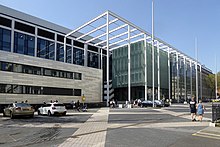Education

Tertiary education
See Also: List of universities and higher education colleges in London
London is a major global centre of higher education teaching and research and has the largest concentration of higher education institutes in Europe. According to the QS World University Rankings 2015/16, London has the greatest concentration of top class universities in the world and its international student population of around 110,000 is larger than any other city in the world. A 2014 PricewaterhouseCoopers report termed London the global capital of higher education.
A number of world-leading education institutions are based in London. In the 2014/15 QS World University Rankings, Imperial College London is ranked joint-second in the world, University College London (UCL) is ranked fifth, and King's College London (KCL) is ranked 16th.needs update The London School of Economics has been described as the world's leading social science institution for both teaching and research. The London Business School is considered one of the world's leading business schools and in 2015 its MBA programme was ranked second-best in the world by the Financial Times. The city is also home to three of the world's top ten performing arts schools (as ranked by the 2020 QS World University Rankings): the Royal College of Music (ranking 2nd in the world), the Royal Academy of Music (ranking 4th) and the Guildhall School of Music and Drama (ranking 6th).
With 178,735 students in London and around 48,000 in University of London Worldwide, the federal University of London is the largest contact teaching university in the UK. It includes five multi-faculty universities – City, King's College London, Queen Mary, Royal Holloway and UCL – and a number of smaller and more specialised institutions including Birkbeck, the Courtauld Institute of Art, Goldsmiths, the London Business School, the London School of Economics, the London School of Hygiene & Tropical Medicine, the Royal Academy of Music, the Central School of Speech and Drama, the Royal Veterinary College and the School of Oriental and African Studies. Members of the University of London have their own admissions procedures, and most award their own degrees.
A number of universities in London are outside the University of London system, including Brunel University, Imperial College Londonnote , Kingston University, London Metropolitan University, University of East London, University of West London, University of Westminster, London South Bank University, Middlesex University, and University of the Arts London (the largest university of art, design, fashion, communication and the performing arts in Europe). In addition there are three international universities in London – Regent's University London, Richmond, The American International University in London and Schiller International University.
London is home to five major medical schools – Barts and The London School of Medicine and Dentistry (part of Queen Mary), King's College London School of Medicine (the largest medical school in Europe), Imperial College School of Medicine, UCL Medical School and St George's, University of London – and has many affiliated teaching hospitals. It is also a major centre for biomedical research, and three of the UK's eight academic health science centres are based in the city – Imperial College Healthcare, King's Health Partners and UCL Partners (the largest such centre in Europe). Additionally, many biomedical and biotechnology spin out companies from these research institutions are based around the city, most prominently in White City.
There are a number of business schools in London, including the London School of Business and Finance, Cass Business School (part of City University London), Hult International Business School, ESCP Europe, European Business School London, Imperial College Business School, the London Business School and the UCL School of Management. London is also home to many specialist arts education institutions, including the Academy of Live and Recorded Arts, Central School of Ballet, LAMDA, London College of Contemporary Arts (LCCA), London Contemporary Dance School, National Centre for Circus Arts, RADA, Rambert School of Ballet and Contemporary Dance, the Royal College of Art and Trinity Laban.
Primary and secondary education
The majority of primary and secondary schools and further-education colleges in London are controlled by the London boroughs or otherwise state-funded; leading examples include Ashbourne College, Bethnal Green Academy, Brampton Manor Academy, City and Islington College, City of Westminster College, David Game College, Ealing, Hammersmith and West London College, Leyton Sixth Form College, London Academy of Excellence, Tower Hamlets College, and Newham Collegiate Sixth Form Centre. There are also a number of private schools and colleges in London, some old and famous, such as City of London School, Harrow, St Paul's School, Haberdashers' Aske's Boys' School, University College School, The John Lyon School, Highgate School and Westminster School.
Comments
Post a Comment